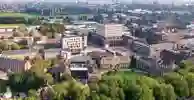Funded PhD opportunities
Our research impacts the world. Join us. Find out about our exciting funded PhD opportunities.

Current available opportunities
Applying for a scholarship is a bit like applying for a job: once you have applied to Hull your application will be assessed against specific criteria and, if you are shortlisted, you will be invited to an interview. Ensure you read the project description and eligibility criteria very carefully before you apply to see whether you have the skills, knowledge and experience required.
We strongly encourage you to contact the academics listed on the project pages if you have any questions. Applications to Hull are via our online application portal and links to apply are on the individual project web pages. You can apply for more than one scholarship opportunity across different clusters.
Just so you know...
New opportunities become available throughout the year, so check back regularly.
Why study a PhD at Hull?
We’re proud of the impact our research has on our local, national and global community. Our work is changing the way we think, the way we work, the way we interact with each other, and the world around us.
And you can be part of that, in an inclusive, one-campus community and a famously friendly city. It's all here waiting for you.

Life on campus
2 mins
Our research
Accelerating a net zero future. Improving health outcomes. Promoting justice and fairness for all. Living with water. Enhancing heritage and creative industries. Our research impacts the world.
Stay in touch